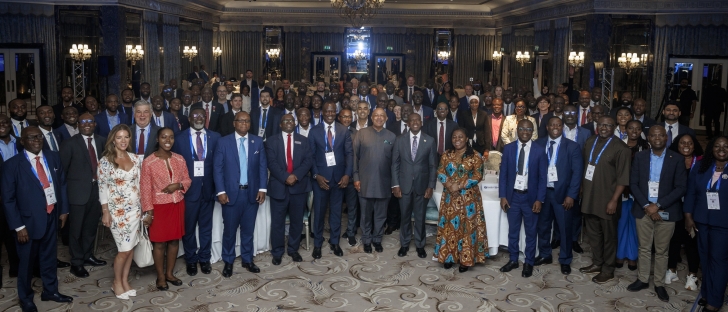Ghana International Bank (GHIB) has concluded its flagship thought-leadership forum, GHIBCONVERGE 2025, after three days of deliberations on reshaping Africa’s approach to commodity trade and finance.
The event, held from August 6-8, 2025, in the City of London, brought together policymakers, financiers, commodity executives, legal specialists, and development experts to craft strategies for moving the continent away from raw commodity exports towards value-added trade, supported by sustainable finance and modern infrastructure.
Operating under the theme “Rethinking Commodity Finance for Growth”, the conference examined structural reforms needed to accelerate Africa’s industrialisation, enhance its trade position, and generate new sources of revenue.
Opening the discussions, GHIB Chief Executive Officer Dean Adansi called for a fundamental re-engineering of Africa’s commodity export model. He stressed that only 14 per cent of Africa’s exports were value-added goods — a figure that has remained stagnant for decades. “We are sitting on untapped billions in export revenues because we continue to export raw cocoa instead of chocolate, raw gold instead of refined bullion, and raw cashew instead of processed kernels,” Mr Adansi said. He proposed the creation of dedicated value-addition funds, structured trade finance for processing plants, and regional regulatory harmonisation under the African Continental Free Trade Area (AfCFTA).
The central bank perspective was also strongly represented. Governor Buah Saidy of The Gambia argued that commodities should be leveraged to anchor African economies. “For too long, Africa’s commodity wealth has been exported in its rawest form, leaving value and jobs offshore,” he said. “By investing in domestic refining capacity, building regional value chains, and securing fairer terms of trade, we can anchor our currencies, strengthen reserves, and create lasting resilience in our economies.”
From Ghana, Dr Zakaria Mumuni, First Deputy Governor of the Bank of Ghana, emphasised the strategic importance of refining gold at source. “Ghana’s long-term macroeconomic stability depends on our ability to capture more value from the commodities we produce,” he stated. “Expanding our domestic gold refining capacity is not just about increasing export revenues; it is about building resilience into our reserves, improving our trade balance, and ensuring that Ghanaians benefit more directly from the resources we own.”
On the second day, Lord Paul Boateng, a GHIB Board Member and former UK Cabinet Minister, framed Africa’s commodities as strategic geopolitical assets. “Critical minerals, cocoa, gold, these are not just export lines in a trade ledger,” he argued. “They are bargaining chips in a changing global order, and Africa must use them to secure technology transfer, infrastructure investment, and sustainable value chains.”
Panels and fireside discussions across the three days explored a broad range of themes including commodity finance innovations, agro-commodity processing, AI and blockchain in trade, risk management, and the financing of mineral and petroleum projects. A recurring theme throughout was sustainability, with participants stressing the need for environmental, social and governance (ESG) principles to underpin Africa’s long-term competitiveness in global markets.
The forum also facilitated new partnerships, including an agreement between GHIB and Vista Bank to expand trade finance across West Africa. During the closing ceremony, GHIB honoured Edmund Poku, Chief Executive of Niche Cocoa Industry Ltd, with its inaugural Trader of the Year award. Mr Poku was recognised for spearheading value addition in cocoa processing, enabling African firms to compete globally while creating jobs and retaining greater wealth on the continent.
Closing the event, Mr Adansi reiterated GHIB’s role as a bridge between African opportunity and international capital. “The transformation will not be led by governments alone or by the private sector alone. It requires a coalition of committed actors who see beyond short-term margins to long-term wealth creation for Africa. GHIB will continue to be that bridge — between African opportunity and global capital, between raw potential and realised value.”
